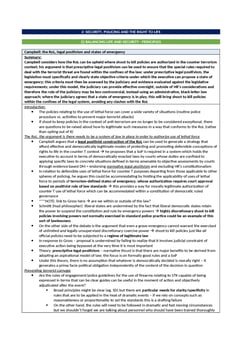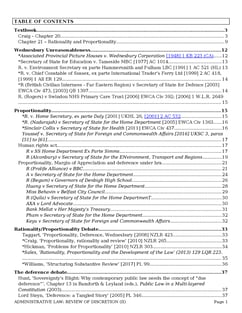R v Home Secretary, ex parte Daly [2001] 3 All ER 433
Judgement for the case R v Home Secretary, ex parte Daly
KEY POINTS
The policy, while it excludes prisoners during the examination of their legally privileged correspondence, may infringe a prisoner's common law right to privilege. However, this infringement can be justified as a necessary and appropriate measure to uphold security, order, discipline within prisons, and to prevent criminal activities.
The proportionality test requires that limitations on rights must be justified by a legitimate and important objective, and the measures used to achieve that objective must be rational and not more restrictive than necessary.
-
Lord Steyn: To decide if a limitation (by a law, rule, or decision) is fair and not too much, the court should consider whether:
“the legislative objective is sufficiently important to justify limiting a fundamental right;
the measures designed to meet the legislative objective are rationally connected to it; and
the means used to impair the right or freedom are no more than is necessary to accomplish the objective.”
FACTS
The Home Secretary introduced a new policy regarding the searching of cells in closed prisons in England and Wales. The policy, outlined in the Security Manual, included provisions such as accompanying cell searches with strip searches, not allowing prisoners to be present during a search, and examining legal correspondence in the absence of the prisoner during a cell search.
The policy was introduced following an escape by high-risk prisoners from HMP Whitemoor in 1994, which revealed extensive mismanagement and lax security practices. One of the inquiry team's recommendations to improve security was to conduct frequent but irregular cell searches, during which prisoners would be excluded from their cells to prevent intimidation. The policy did not initially consider legal professional privilege or confidentiality.
Mr. Daly, a long-term prisoner, challenged the lawfulness of the policy. He specifically objected to the part of the policy that prohibited prisoners from being present when their legally privileged correspondence was examined by prison officers. He argued that this blanket policy violated a fundamental right recognized in both common law and the European Convention for the Protection of Human Rights and Fundamental Freedoms.
JUDGEMENT
Appeal allowed.
COMMENTARY
This case established a significant legal precedent that addresses the delicate balance between security measures in prisons and the protection of prisoners' legal rights, particularly the right to legal professional privilege.
It introduced a proportionality test that has since played a crucial role in assessing the legality of government actions that may restrict fundamental rights.
ORIGINAL ANALYSIS
Plaintiff contended that a policy that forced prisoners to be outside their cell while their legally privileged correspondence was examined was unlawful.
He sought judicial review of the policy which the HL granted.
The policy was also contrary to ECHR art 8 but could be struck down under English law without resorting to the convention.
Lord Bingham
The policy infringes Plaintiff’s right to confidential legal exchange with his lawyer. He recognises the ECHR’s observances about the need to grant effective remedies where ECHR articles have been breached and that Wednesbury doesn’t always provide for this.
He agrees with Lord Steyn’s observances.
Lord Steyn
-
Differences between proportionality and Wednesbury unreasonableness/ irrationality:
The former requires the court to asses the actual balance struck by DM, and not merely whether it was within a range of reasonable alternatives;
The former may require attention to be directed to the relative weight accorded to interests and considerations; and
Even the “heightened scrutiny” version of Wednesbury unreasonableness developed in ex parte Smith is not as intense as proportionality and not sufficient to meet the requirements of the ECHR.
Therefore it is important that that the correct level of review is adopted where ECHR rights are concerned.
“This does not mean that there has been a shift to merits review”. He quotes Laws LJ in Mahmood as correctly saying that “the intensity of review in a public law case will depend on the subject matter in hand”.
-
He concludes with “In law context is everything”.
NB He has stopped short of calling for the wholesale replacement of Wednesbury with proportionality and has maintained that they both have a role to play. This perpetuates the confusing position of the law that Lord Slynn and Dyson LJ railed against (see above).
Lord Cooke
I think that the day will come when it will be more widely recognised that Associated Provincial Picture Houses Ltd v Wednesbury Corpn [1948] 1 KB 223 was an unfortunately retrogressive decision in English administrative law, in so far as it suggested that there are degrees of unreasonableness and that only a very extreme degree can bring an administrative decision within the legitimate scope of judicial invalidation.
The depth of judicial review and the deference due to administrative discretion vary with the subject matter. It may well be, however, that the law can never be satisfied in any administrative field merely by a finding that the decision under review is not capricious or absurd.
RELATED CASES
For Further Study on R v Home Secretary, ex parte Daly

A collection of the best BCL notes the director of Oxbridge Notes (an O...
Need instant answers? Our AI exam tutor is here to help.
Ask questions 🙋 Get answers 📔 It's simple 👁️👄👁️
Our AI is educated by the highest scoring students across all subjects and schools. Join hundreds of your peers today.
Get StartedSimilar Cases
Related Product Samples
These product samples contain the same concepts we cover in this case.

 Since 2010, Oxbridge Notes has been a trusted education marketplace, supplying high-quality materials from top achievers at universities like Oxford, Cambridge, LSE, Harvard, and Yale.
Since 2010, Oxbridge Notes has been a trusted education marketplace, supplying high-quality materials from top achievers at universities like Oxford, Cambridge, LSE, Harvard, and Yale.